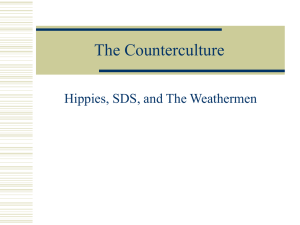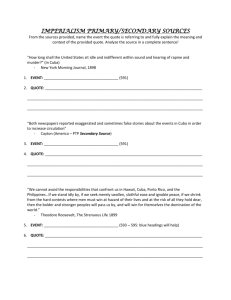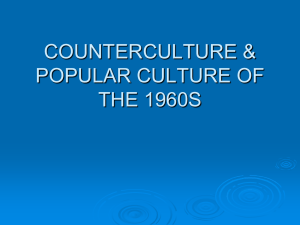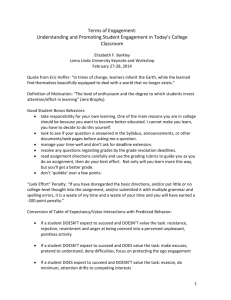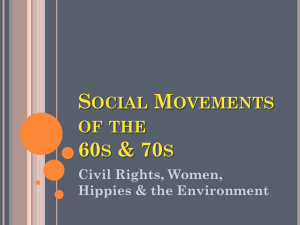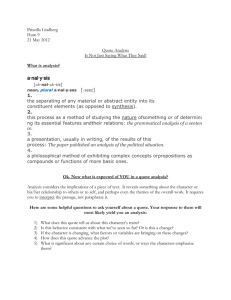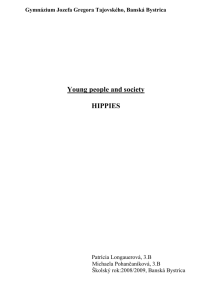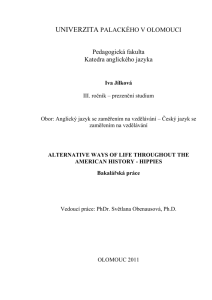File - Julia Swordy
advertisement
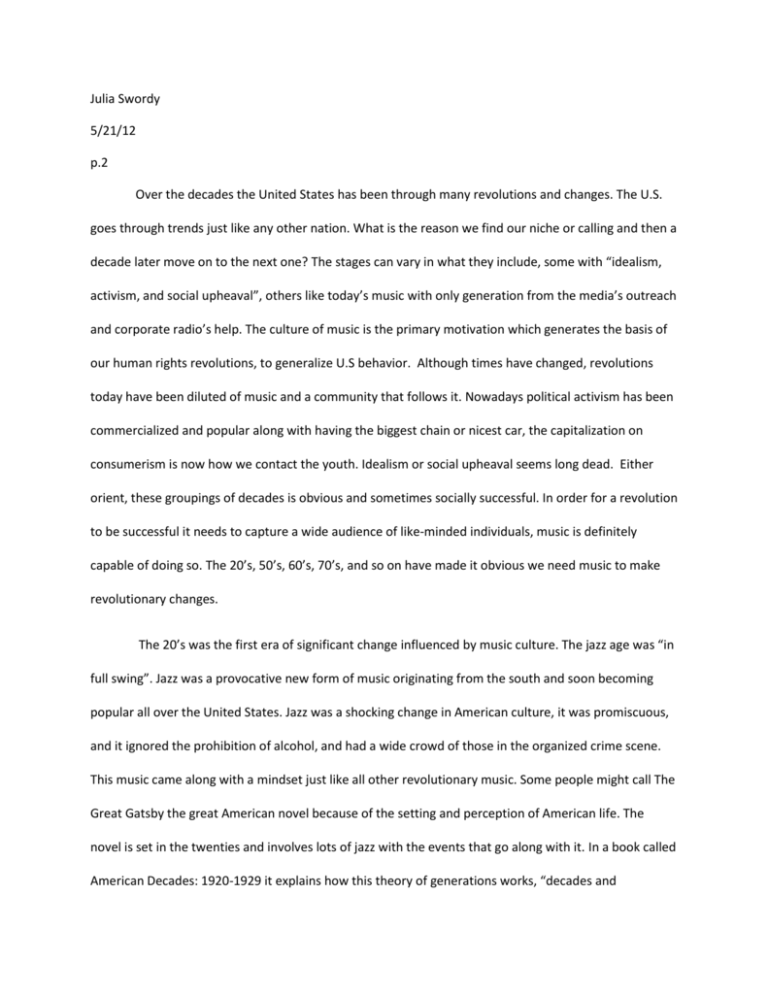
Julia Swordy 5/21/12 p.2 Over the decades the United States has been through many revolutions and changes. The U.S. goes through trends just like any other nation. What is the reason we find our niche or calling and then a decade later move on to the next one? The stages can vary in what they include, some with “idealism, activism, and social upheaval”, others like today’s music with only generation from the media’s outreach and corporate radio’s help. The culture of music is the primary motivation which generates the basis of our human rights revolutions, to generalize U.S behavior. Although times have changed, revolutions today have been diluted of music and a community that follows it. Nowadays political activism has been commercialized and popular along with having the biggest chain or nicest car, the capitalization on consumerism is now how we contact the youth. Idealism or social upheaval seems long dead. Either orient, these groupings of decades is obvious and sometimes socially successful. In order for a revolution to be successful it needs to capture a wide audience of like-minded individuals, music is definitely capable of doing so. The 20’s, 50’s, 60’s, 70’s, and so on have made it obvious we need music to make revolutionary changes. The 20’s was the first era of significant change influenced by music culture. The jazz age was “in full swing”. Jazz was a provocative new form of music originating from the south and soon becoming popular all over the United States. Jazz was a shocking change in American culture, it was promiscuous, and it ignored the prohibition of alcohol, and had a wide crowd of those in the organized crime scene. This music came along with a mindset just like all other revolutionary music. Some people might call The Great Gatsby the great American novel because of the setting and perception of American life. The novel is set in the twenties and involves lots of jazz with the events that go along with it. In a book called American Decades: 1920-1929 it explains how this theory of generations works, “decades and generations acquire labels that stick, whether or not they are accurate. No label or slogan can accurately cover a generation…Nonetheless, the label “lost generation” stuck to the people who had been exposed to World War I, implying that they were permanent casualties. The term achieved currency through its appearance on the epigraph page of Ernest Hemingway’s The Sun Also Rises (1926): “You are all a lost generation”…Much later Hemingway explained that his use of “lost generation” was intended to be ironic, not literally defining. However, the war did cause a great and permanent change in the way people- especially artists- born after 1890 viewed the world.” This quote explains that when it comes to generations you can’t generalize. The quote also tells us that the generation of the 20’s was set on their distorted view of being a “lost generation”. The war had such an affect that people assumed their position was permanent. This view point was important because it affected the way society worked. Once America thought they were a “lost generation” or lost cause they stopped caring about the social norm, generating the like mindedness of the U.S. Once everyone thought the same way they stared to rebel, or revolutionize, alcohol prohibition was petty to most and bigger things were starting, the start of the gangster was a product of the 20’s. Gangsters made organized crime a breeze, if you were in on that scene you had all the right friends in all the right places, furthering the connection of an underground community. The great Gatsby is a great example of all that was flourishing in this era, “The lights grow brighter as earth lurches away from the sun and now the orchestra is playing yellow cocktail music and the opera pitches a key higher. Laughter is easier, minute by minute, spilled with prodigality, tipped out at a cheerful word. The group changes more swiftly, swell with new arrivals…” The author describes this as being one and feeling a connection between all and the earth here. By being all connected there’s more of a feeling they can collectively conquer whatever necessary. It can be assumed that the twenties was certainly a time of revolutionary change. “By seven o’clock the orchestra had arrived- no thin five piece affair but a whole pit full of oboes and trombones and saxophones and viols and cornets and piccolos and low and high drums the last swimmers have come in from the beach now are dressing upstairs; the cars from New York are parked five deep in the drive, and already the nails and salons and verandas are gaudy with primary colors…The bar is in full swing and floating rounds of cocktails permeate the garden outside until the air is alive with chatter and laughter and casual innuendo and introductions forgotten on the spot and enthusiastic meetings between women who never knew each other’s names.” The women in this quote are seen as easy going and not as proper than years before the 20’s. This quote makes a more clear connection between jazz music and the thriving audience it draws. It is important to see that music creates a unified audience in the 20’s like in this quote and in many other generations. Most importantly, the generation was so far unique to this mindset of collective revolution. The 20’s was unique in this way because it was the first true obvious revolution involving music for the U.S. “When the Jazz history of the world was over girls were putting their heads on men’s shoulders swooning backward playfully into men’s arms, even into groupings knowing that someone would arrest their fall…” Women in this era knew that there were no longer boundaries involving sexuality. When sexuality is a factor there is a real revolution going on. In every generation of significant change, sexuality is a prime example something big is happening. It is important to see sexuality as another revolutionary factor. “There was dancing now on the canvas in the garden, old men pushing young girls backward in eternal graceless circles, superior couples holding each other tortuously” in another quote “”She had a fight with a man who says he’s her husband” explained a girl at my elbow. I looked around. Most of the remaining women were now having fights with their husbands”, here the women have made it clear there are no more boundaries of their personalities or sexuality. They feel free to publicly rebel against their men in the second quote, which never seemed appropriate before. Women are now able to dance how they want, drink what they want, and do what they want in general, this is crucially important. Women have now gained societal rights, much like that of all other revolutions. The next era of focus is the 60’s-70. The 60’s seemed to have the strongest connection between people and music. I’m talking about the hippies. Hippies were a new breed of people. They wanted to go against the grain through peace and enlightenment. Hippies were sick of the way consumerism captured America and wanted to shun any materialistic tendencies. Hippies weren’t only worried about the state of human “life” they were worried about our one and only home, the earth. Hippies wanted to create a society of like-minded people that could all make a positive community to better human and the environment. They created their community through wonderful music like the Grateful dead, Jefferson Airplane, Janis Joplin and many others. Haight Ashbury was a district of San Francisco in which the culture was thriving the most, it was known as hippie central back in the 60’s. From the Encyclopedia of the 60’s, “Depending on who you talked to at the time, young people in the 1960’s were seen as passionate idealists seeking to establish a more equitable and loving world, as dangerous radicals fomenting revolution, or as bizarre nonconformists refusing to live by society’s rules. Indeed, some were intensely political, focused on civil rights, on ending the Vietnam War, or on building a new society. Others adopted a more individual focus, using LSD or meditation or the study of Eastern religions to explore the inner depths of their own consciousness. Whichever direction they followed, by mid-decade it was clear that the interests of many young people ran counter to the mainstream culture.” This paragraph perfectly explains the ideals of the hippie, well it was a beautiful concept. This quote is perfect, Hippies created a counterculture that stuck around for a while. By using psychedelics they achieved enlightenment and like-minded viewpoints for a positive world. Many studies have been conducted on lysergide (LSD) and the results state that the after effect gives you a sense of community, understanding, and much enlightenment. From The Grateful Dead and Philosophy, “Everyone knows that the 1960’s was a decade of idealism, activism, and social upheaval. What it all meant however has never been clear. Where the liberals took credit for its political successes, and where conservatives renounced each and every excess, the counterculture radicals have been dismissed, misunderstood, or marketed for nostalgia. According to one standard view, the counterculture was a utopian illusion born at Woodstock and buried at Altamont. More charitably, some say that the counterculture was a political failure but a cultural success…” This book is great for understanding the philosophy of the counterculture, their motives, and morals. Although the quote above reveals that the 1960’s was very much alive with this movement, it’s important to know how it failed. Back to the Encyclopedia of the 60’s this quote refers to the Haight Ashbury district “Unprepared for large numbers of people, the neighborhood became too crowded, resulting in drug problems, homelessness, rapes, and nearly 3,000 burglaries.” It was the death of the hippie. Truly upset by this people tried to promote the revival of the true counterculture, although they failed the movement still has made its mark. Music has the ability to connect people emotionally, politically, or metaphysically as the dead heads would say. It’s amazing that so many things have come of musical generations. The culture of music is the primary motivation which generates the basis of our human rights revolutions, to generalize U.S behavior. If we as U.S citizens can make a statement as strong as the 1960’s through likemindedness we should be able to overcome our modern day obstacles. The environment we live in is slowly depleting and as tragic as it is most of the U.S. either denies this fact or cannot bring themselves to attempt to help. Occupy Wall Street is the most recent modern revolution, along with a huge one. Although this movement was quite real, there was no culture it brought along. Who knows what could have been the results if there was musical community. We as Americans clearly still have the ability to provoke change, all we need is a basis of thought we all agree with, the will to conquer our state of being, and some great music we can all enjoy.


